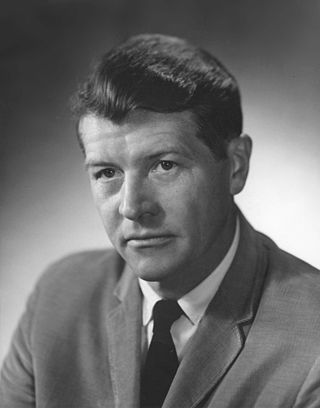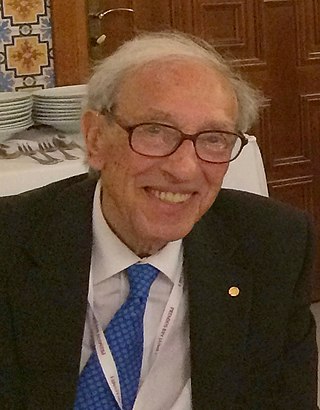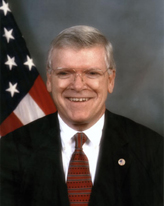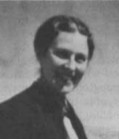Related Research Articles

The drug combination fenfluramine/phentermine, usually called fen-phen, was an anti-obesity treatment in the early 1990s that utilized two anorectics. Fenfluramine was marketed by American Home Products as Pondimin, but was shown to cause potentially fatal pulmonary hypertension and heart valve problems, which eventually led to its withdrawal in 1997 and legal damages of over $13 billion. Phentermine was not shown to have harmful effects.

Christian Boehmer Anfinsen Jr. was an American biochemist. He shared the 1972 Nobel Prize in Chemistry with Stanford Moore and William Howard Stein for work on ribonuclease, especially concerning the connection between the amino acid sequence and the biologically active conformation.

Donepezil, sold under the brand name Aricept among others, is a medication used to treat dementia of the Alzheimer's type. It appears to result in a small benefit in mental function and ability to function. Use, however, has not been shown to change the progression of the disease. Treatment should be stopped if no benefit is seen. It is taken by mouth or via a transdermal patch.
Thaddeus Robert Rudolph Mann CBE FRS was a biochemist who made significant contributions to the field of reproductive biology. Mann was born in Lwow, Austria-Hungary and was educated at Lwow University. He studied medicine at the Johannes Casimirus University in Lwow, obtaining the degrees of Physician in 1932 and Doctor of Medicine in 1934.
Autar Singh Paintal was a medical scientist who made pioneering discoveries in the area of neurosciences and respiratory sciences. He is the first Indian Physiologist to become the Fellow of the Royal Society, London.

Edmond Henri Fischer was a Swiss-American biochemist. He and his collaborator Edwin G. Krebs were awarded the Nobel Prize in Physiology or Medicine in 1992 for describing how reversible phosphorylation works as a switch to activate proteins and regulate various cellular processes. From 2007 until 2014, he was the Honorary President of the World Cultural Council. At the time of his death at age 101 in 2021, he was the oldest living Nobel Prize laureate.

Andrew C. von Eschenbach was the Commissioner of the United States Food and Drug Administration from 2006 to 2009. He became acting Commissioner on September 26, 2005, after the resignation of his predecessor Lester Crawford, and was confirmed as Commissioner by the Senate on December 7, 2006. He was previously the 12th director of the National Cancer Institute.

Joseph Michael Mercola is an American alternative medicine proponent, osteopathic physician, and Internet business personality whose net worth, as declared in 2017, had grown to over $100 million. He markets largely unproven dietary supplements and medical devices. On his website, Mercola and colleagues advocate unproven and pseudoscientific alternative health notions including homeopathy and opposition to vaccination. These positions have received persistent criticism. Mercola is a member of several alternative medicine organizations as well as the political advocacy group Association of American Physicians and Surgeons, which promotes scientifically discredited views about medicine and disease. Until 2013, Mercola operated the Dr. Mercola Natural Health Center in Schaumburg, Illinois. He is the author of two books.
Boyd Eugene Haley is a retired professor of chemistry at the University of Kentucky.

Dexfenfluramine, marketed as dexfenfluramine hydrochloride under the name Redux, is a serotonergic anorectic drug: it reduces appetite by increasing the amount of extracellular serotonin in the brain. It is the d-enantiomer of fenfluramine and is structurally similar to amphetamine, but lacks any psychologically stimulating effects.
Efraim Racker was an Austrian biochemist who was responsible for identifying and purifying Factor 1 (F1), the first part of the ATP synthase enzyme to be characterised. F1 is only a part of a larger ATP synthase complex known as Complex V. It is a peripheral membrane protein attached to component Fo, which is integral to the membrane.
Richard D. Cummings is an American biochemist who is the S. Daniel Abraham Professor of Surgery at Beth Israel Deaconess Medical Center and Harvard Medical School in Boston, MA. He also the Chief of the Division of Surgical Sciences within the Department of Surgery. He is the Director of the Harvard Medical School Center for Glycoscience, Director of the National Center for Functional Glycomics, and also founder of the Glycomics Core at BIDMC. As of 2018 Cummings is also the Scientific Director of the Feihi Nutrition Laboratory at BIDMC. Before moving to BIDMC/HMS, Cummings was the William Patterson Timmie Professor and Chair of the Department of Biochemistry at Emory University School of Medicine in Atlanta, Georgia from 2006-2015. At Emory, Cummings was a founder in 2007 of the Emory Glycomics Center.
Gualberto Ruaño is a pioneer in the field of personalized medicine and the inventor of molecular diagnostic systems used worldwide for the management of viral diseases. Ruaño is President and Founder of Genomas, a genetics-related company and now the bio-tech anchor of Hartford Hospital’s Genetic Research Center; he also serves as Director of genetics research at the Center.
William Canfield is a glycobiologist, chief scientific officer and founder of an Oklahoma City-based biotechnology company, Novazyme, which was acquired by Genzyme in August 2001 and developed, among other things, an enzyme that can stabilize Pompe disease, based on Canfield's ongoing research since 1998. Canfield subsequently left Genzyme and established, with his partner in the Novazyme operation, John Crowley, another research laboratory, which he still heads. He saved Cytovance from bankruptcy by forming an investor group and raising $9 million after Crowley suddenly left the lab in 2005 to become the chief executive officer at Amicus Therapeutics in New Jersey
William Koopmans Summers is an independent neuroscientist and was the inventor of Tacrine (Cognex) as a treatment for Alzheimer's disease {US Patent No. 4,816,456}. Tacrine was the first FDA approved anti-dementia drug. Today there are five FDA approved anti-dementia drugs.

Lester Mills Crawford is an American veterinarian and former Commissioner of the U.S. Food and Drug Administration who was appointed by President George W. Bush. He served from July 18, 2005 until resigning two months later in September 2005.
Fred August Kummerow was a German-born American biochemist. A longtime professor of comparative biosciences at the University of Illinois at Urbana–Champaign, Kummerow was best known as an opponent of the use of artificial trans fats in processed foods, carrying out a 50-year campaign for a federal ban on the use of the substance in processed foods. He was one of the pioneers in establishing the connection between trans fats and heart disease, and he helped to cement the inclusion of trans fats into the Nurses' Health Study. He also helped discover that it is oxidized cholesterol, rather than the cholesterol, that causes heart disease.
Minor Jesser Coon was an American biochemist and Victor V Vaughan Distinguished University Professor Emeritus at the University of Michigan, Ann Arbor. He is best known for his research on cytochrome P-450 and as the co-discoverer of HMG-CoA, along with Bimal Kumar Bachhawat. He died on September 5, 2018 from complications due to Alzheimer's disease.

Cecilia Lutwak-Mann was a Polish-British endocrinologist and physiologist.
Ariel Gideon Loewy (1925–2001) was a biochemist and cell biologist who spent most of his career on the faculty at Haverford College in Haverford, Pennsylvania and was an adjunct professor at the Philadelphia College of Osteopathic Medicine at the time of his death in 2001. Loewy was widely recognized for his research on the biochemistry of blood clotting and his identification of Factor XIII, an enzyme involved in the clotting pathway. He also played a major role in the development of the molecular biology and biochemistry curricula at Haverford.
References
- 1 2 Estrada, Louie (March 4, 2006). "Leo Lutwak". The Washington Post. Retrieved 18 November 2019.